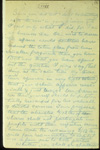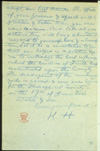Mahatma Letter No. 100
| Quick Facts | |
|---|---|
| People involved | |
| Written by: | Koot Hoomi |
| Received by: | A. P. Sinnett |
| Sent via: | unknown |
| Dates | |
| Written on: | unknown |
| Received on: | December 1882 |
| Other dates: | unknown |
| Places | |
| Sent from: | unknown |
| Received at: | Allahabad, India |
| Via: | unknown |
This is Letter No. 100 in The Mahatma Letters to A. P. Sinnett, 4th chronological edition. It corresponds to Letter No. 79 in Barker numbering. See below for Context and background.
< Prev letter chrono
Next letter chrono >
< Prev letter Barker
Next letter Barker >
Page 1 transcription, image, and notes
|
Since you did not "deal exhaustively with the case" in your previous note I said only what I did, for I am no business man. One used to mercantile affairs would doubtless have deduced the entire plan from even smaller fragments than you have. But now that you have opened out the question I may say (holding at the same time my amateur opinion in very light esteem) that your scheme appears reasonable and just enough. Mr. Dare, no less than yourself should be substantially rewarded for his valuable and devoted services. Your proposal that the alienated 4/12th's of shares shall not participate in profits until their respective owners have made the remaining 8/12th's yield fair remuneration to capital — is a fair one to both parties. Whether you shall or shall not |
NOTES: |
Page 2
|
eventually issue a duplex, or quadruplex journal, I still think that if practicable, the larger amount of capital should be sought after, for, when you are fully equipped for any emergency you may deliberately adopt such plan as cool judgment and a calculation of all the chances may indicate as best. And now, before quitting my novel relation of a business adviser, I must repeat that while we will help the enterprise from first to last as fully as possible within our rules, the initiative must be taken by your friends and ought to be guided and sympathised with by yourself, and I will just tell you why. While the greatest good ought to result from the successful establishment of such a journal, the strict law of justice forbids us to do aught to les |
NOTES: |
Page 3
|
sen in the slightest degree the merit to which he who shall make the dream a reality will be entitled. Few are those who know their future or what is best for them. No doubt, life on the European continent and in England possesses charms lacked by poor, dull India. But the latter can, on the other hand, offer privileges and attractions undreamt of by the average mystic. I dare not say more; but, you are wrong, friend, very wrong in consenting to stop here ONLY for my sake. I, at least, do not feel myself selfish enough to accept the sacrifice, had I not known what I do. For your obliging compliance with our wishes that you should attend the anniversary celebration |
NOTES: |
Page 4
|
accept our best thanks. The effects of your presence and speech will be greater and better than you can now conceive. And, like all good actions, they will bring abundant reward for yourself — here and — hereafter. Let it be a consolation to you that you helped in a positive degree to neutralize the evil influences which the enemies of Truth had concentrated upon the Society. The dead-point of the revolving cycle is passed: a new one begins for the Theosophical Society — on the 17th of December. Watch and see. Ever your friend, |
NOTES: |
Context and background
Physical description of letter
The original is in the British Library, Folio 3. George Linton and Virginia Hanson described the letter in this way:
KH script in blue pencil on a sheet of folded heavy note paper, both sides in heavy lettering.[1]
Publication history
Commentary about this letter
The opening sentence of this letter implies that Sinnett responded to the Mahatma’s letter containing the Mahachohan’s suggestions with some further ideas of his own.
Notes
- ↑ George E. Linton and Virginia Hanson, eds., Readers Guide to The Mahatma Letters to A. P. Sinnett (Adyar, Chennai, India: Theosophical Publishing House, 1972), 164 .



